Strengthening Local and Regional Strategies for Economic Transformation in Tanzania
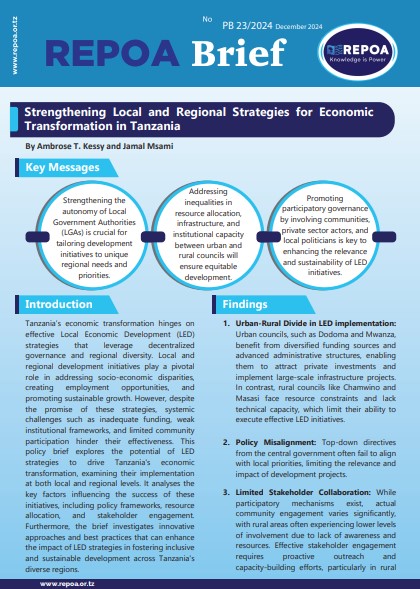
This policy brief explores the potential of Local Economic Development (LED) strategies to drive Tanzania’s economic transformation, examining their implementation at both local and regional levels. It analyses the key factors influencing the success of these initiatives, including policy frameworks, resource allocation, and stakeholder engagement. Furthermore, the brief investigates innovative approaches and best practices that […]
Enhancing smallholder tomato farmers’ adaptive capacity through access to and uptake of climate change information in Tanzania

This policy brief investigates factors that influence access to and uptake of climate change information by smallholder tomato growers, and the key strategies for improving access to and uptake of climate change information by smallholder tomato growers. READ ON…!
Urban solid waste management and the decent work: Insights from Tanzania’s key cities
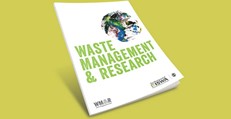
This study investigates the labour practices of employed and freelance solid waste workers in Tanzania’s major cities namely Dar es Salaam, Mwanza, and Dodoma through the lens of the International Labour Organization’s (ILO) decent work framework. Focusing on key areas such as job and income security, fair wages, occupational health and safety, child protection and […]
Unlocking Tanzania’s potential: Youth look to jobs, entrepreneurial opportunities
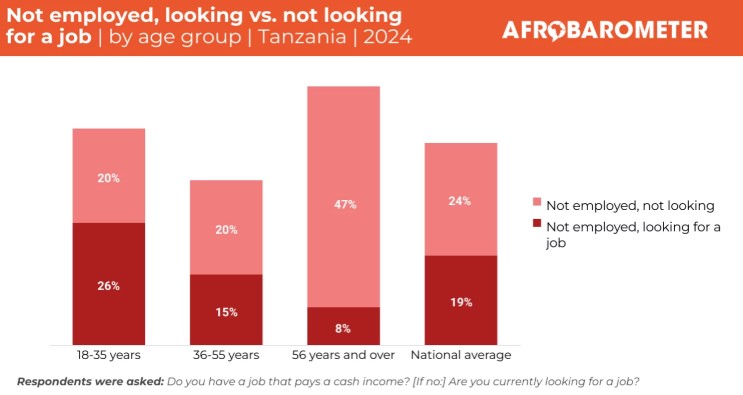
On their top priorities for government action – including health, water supply, infrastructure/roads, electricity, education, and job creation – young citizens give the government positive performance reviews, and a majority see the country as moving in “the right direction.” But their assessments of economic and living conditions are less positive, and economic opportunity tops of […]
Tanzanians applaud government performance on health, but it remains their top concern
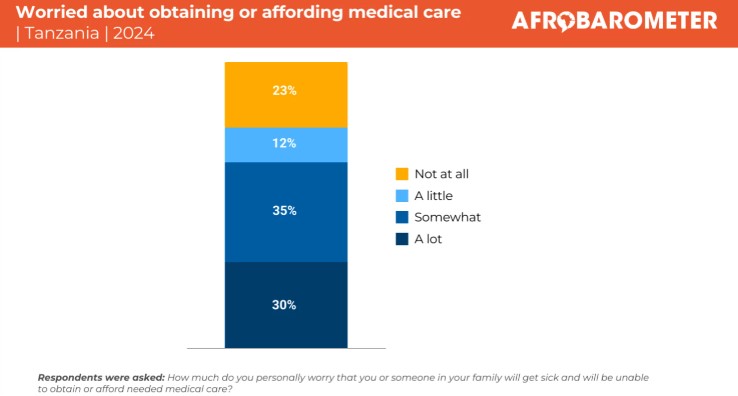
This dispatch/ policy brief presents findings from a special Afrobarometer Round 10 survey module focusing on health care. READ ON by clicking the Download.PDF button…!
Why property tax reforms fail: Lessons from Tanzania
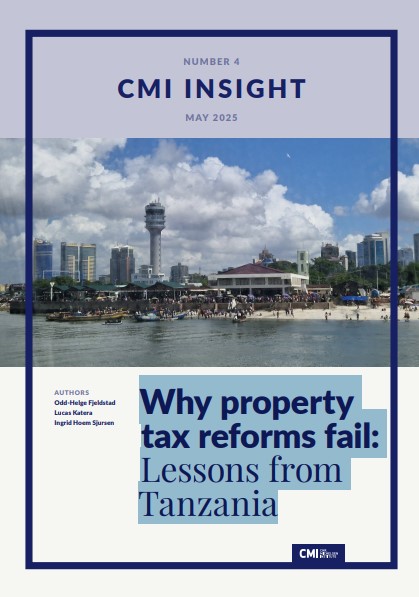
Over the past two decades, property tax administration in Tanzania has undergone substantial changes, shifting between decentralized and centralized collection models. However, despite numerous reform initiatives, these efforts have largely failed to boost tax revenues and improve property tax administration. This CMI (in collaboration with REPOA) Insight outlines five reasons why these reforms have not […]
Taxation and Business Development in Zanzibar: Insights from a Business Survey

The private sector is a critical driver of economic growth in Tanzania. The government has expressed a strong commitment to fostering a vibrant business environment while ensuring sufficient public resources for economic development. However, balancing taxation and business growth remains a challenge. This report presents findings from a survey of businesspeople in Zanzibar, examining their […]
Enhancing Food Security among Smallholders through Climate-Smart Agriculture in Tanzanian Arid Regions

Climate-smart agriculture (CSA) has been proposed as an approach to mitigate some of the threats emanating from climatic changes and guide agriculture management in the era of climate change. This study aimed to (a) assess the CSA practices and technologies and their impacts on household food security among smallholders in Tanzania’s arid and semi-arid agroecological […]
Assessing Small – Scale Fisher’s Use of Traditional Knowledge for Climate Adaptation in Southern Coastal Areas

The study aimed to assess small-scale fishers’ use of traditional knowledge for climate adaptation in Lindi and Mtwara regions located in the Southern Coastal areas of Tanzania. The study used a qualitative research approach wherein in-depth interviews, focus group discussions and observation were used to collect data. Climate change affects fishing activities since rainfall is […]
Evaluating Indigenous Knowledge in Reducing Tomato PHL in Morogoro Region: Case Studies from Mvomero and Morogoro Districts

Tomatoes are one of the most widely consumed vegetables in sub-Saharan Africa, valued for their essential vitamins and minerals. This study assessed the effectiveness of Indigenous Handling Practices (IHP) in reducing post-harvest losses (PHL) in the tomato subsector. Specifically, it examined indigenous handling methods, growers’ perceptions, and factors influencing the adoption of these practices. READ […]
Examining Funding Systems for Local Economic Development in Tanzania: A Key Component of Economic Structural Transformation

This study investigates the funding mechanisms that support Local Economic Development (LED) initiatives across seven regions in Tanzania: Kilimanjaro, Dar es Salaam, Mwanza, Kigoma, Iringa, Dodoma, and Mtwara. LED is recognized as a strategic approach to enhancing local economic capacities through decentralized governance, enabling local authorities to tailor initiatives to their communities’ specific needs. However, […]
Workshop Report: 28th Annual Research Workshop – 2024 “Pursuit for Sustained Growth and Trade Expansion”

REPOA’s Annual Research Workshop (ARW) continues to be the longest running and largest research workshop held in Tanzania by a Tanzanian organisation, where researchers, research users, and development stakeholders meet to discuss research findings, their associated implications for development policy in Tanzania and propose areas of further strategic research. The 28th REPOA’s ARW was conducted […]
Strengthening Link between National Adaptation Plans (NAPs), Sector Policies and National Development Plans: Implications for Climate Change Governance
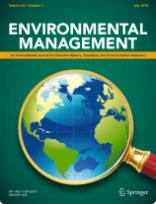
This study intended to understand the extent of climate change coherence across national climate change adaptation planning frameworks, sector policies and national development plans in Tanzania. The findings revealed a weak alignment between national development plans and national climate change response strategies that were attributed to weak alignment between sector policies. However, the study found […]
Strengthening Decentralisation and Local Economic Development in Tanzania: Challenges and Opportunities
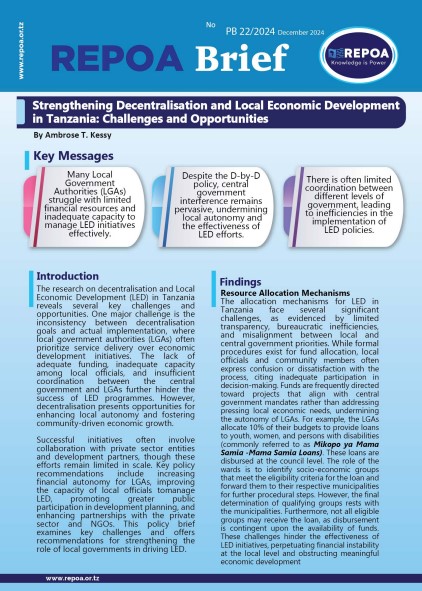
The research on decentralisation and Local Economic Development (LED) in Tanzania reveals several key challenges and opportunities. One major challenge is the inconsistency between decentralisation goals and actual implementation, where local government authorities (LGAs) often prioritize service delivery over economic development initiatives. The lack of adequate funding, inadequate capacity among local officials, and insufficient coordination […]
Strengthening Transparency and Accountability in the Decentralized Funding Systems to enhance Local Economic Development Contributions in Tanzania
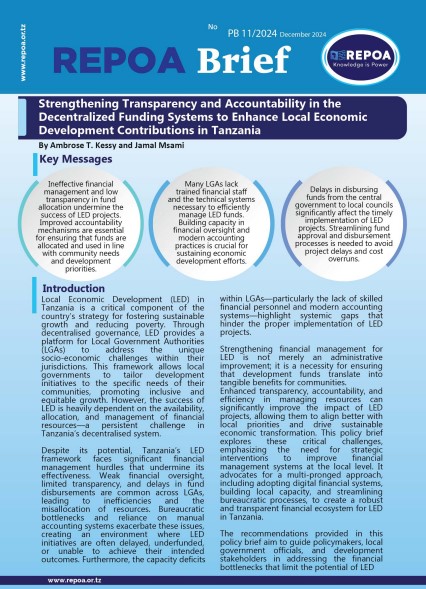
The success of Local Economic Development (LED) in Tanzania is closely linked to the effectiveness of financial management systems at the local level. Improving transparency, building financial management capacity, and decentralising fund disbursement are critical for ensuring that LED initiatives are sustainable and aligned with community development needs. By addressing these challenges, Tanzania can enhance […]
The effects of COVID-19 pandemic on enrollment rates and gender inequalities in Tanzania
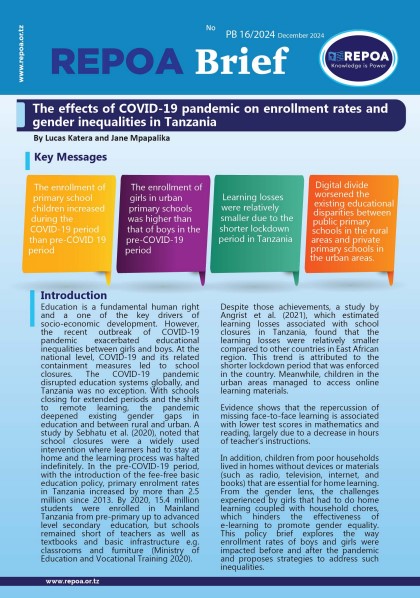
This study compares enrolment in the pre- and post-COVID-19 pandemic. During and after the outbreak of COVID-19 pandemic, enrolment rates rose compared to the pre-COVID-19 period in both public and private schools. Specifically, more girls than boys were enrolled in both Dar es salaam and Dodoma regions. This increase in girls’ enrolment may be attributed […]